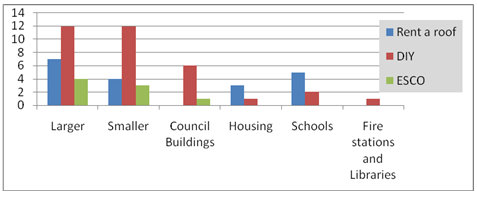Over the last year there has been a rapid multiplying of opportunities and offers open to councils and local government in the solar technology field.
These opportunities have been made possible because of the feed-in tariffs (FITs) for solar electricity offered by the government. The offers being presented to councils have also become more focused and time constrained since the government announced plans to review FIT’s in March 2012.
Currently the value of FITs offered is the following:

Amid the flurry of new possibilities, at Local Energy we wanted to evaluate how public sector organisations can participate in and benefit from the feed-in tariff available from solar photovoltaic panels.
To get an idea of what options councils are considering we sent a survey out to our network members, asking their views on the various financial models that are currently available.
We asked:
1) What sort of scheme do you favour? (Rent-a-roof/ DIY/ ESCO/ other.)
2) Do you have capital available to take advantage of FITs for solar PVs?
3) What amount would you consider an adequate incentive for rent-a-roof (upfront payment per roof)?
4) If there are any specific issues that you would like addressed in our consideration of the options?
From the responses that we received, it was clear that councils were interested in the possibility of investment into the FIT scheme; and further that many had available funds, albeit limited, to invest in such schemes.
Overall, we found that there was interest across the different available options, with respondents overall slightly more interested in DIY possibilities for investment, despite concerns over whether or not they had the capacity for in-house roll-out.

This mix of what councils were considering also extended to all areas within the organisation’s remit where solar panels could be beneficial.
Interestingly, while councils have suggested using school roof’s for the rent-a-roof option, many were very nervous of the potential practical and legal issues involved should schools leave council control entirely by becoming academies. This issue has yet to be resolved for schools that are in the process of changing status, although schools that have already achieved academy status could make a separate deal with the council.
In terms of what councils would expect to gain from the rent-a-roof solar option, we received a wide range of responses. The most common response was that respondents would be happy simply to gain the free electricity generated from solar power, and not receive any further financial incentive. For those who would expect a cash payment, one respondent wanted an upfront payment; whereas others would want an annual payment, with the amounts stated ranging from £35 to £500 per roof per year.
Other issues that came up from the survey included the following:
“Our legal team have advised that even if the PV is fitted for free, the value of the contract is the amount of FIT the installing company could receive. Therefore full procurement rules must be applied.”
“They require a 25 year agreement to be signed and no one in the council is willing”
“…none of the companies who submitted would be capable of delivering on a large scale.”
“…the ESCO model…has the most legal and procurement complexities and therefore would take the longest time to deliver.”
“…procurement for the rent-a-roof schemes as when there is no capital investment and the electricity offered is free it doesn’t fall neatly into a procurement exercise and seems to confuse my procurement colleagues!”
“…YPO are working on a procurement framework that will be ready for August. “
“…there has been some vandalism on a roof mounted solar thermal installation.”
These points make clear that while there is an appetite amongst councils to take advantages of solar schemes currently available, there are also practical, legal and procedural barriers that have to be overcome.
Going forward from this we believe that there is a real need for expert advice and information on the options available to councils, and so we plan to look further at the different solar investment and FITs models; identifying what would work well for councils and how they might address the issues they are likely to face.

As part of this process, we would be keen to hear from you about your experience, ideas and understanding of the opportunities and challenges for councils and the public sector in the solar technology field. You can do this by commenting below, joining our Local Energy Linkedin discussion group, or emailing us directly.
We are also available to speak directly to any councils or local government bodies who are interested in looking at the solar options available, and would like advice about their options.
